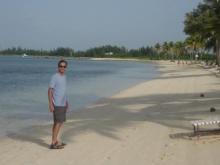
Enrico Cesaretti
New Cabell Hall 459
Project
"Telling Matters: Narratives of Ecological Entanglements in Modern Italy"Project Summary: Located at the juncture of Italian Studies and ecocriticism, my project aims to explore a selection of texts (in an Italian landscape considered at once in its cultural and topological, semiotic and geographical dimensions), in which the boundaries between what is human and nonhuman, organic and inorganic become blurred and indistinct, and ultimately delineate an ontological condition of inter-connectedness, reciprocity and relationality between materials, places and living organisms. Functioning at once as territory and map, as individual site and cognitive instrument, Italy here is a microcosm, a “local” place that may enlighten the situation of many other “global” places and collectives.
Taking inspiration from the still valid advice by Cheryl Glotfelty (among the scholars who significantly contributed to ecocriticism’s “first wave”) to keep “one foot in literature and the other on land,” I intend to sketch an alternative aesthetic and topographic map of the so called Bel paese by investigating, in tandem, a number of imaginative and physical terrains in modern and contemporary Italy where the places, the human bodies, and the substances that have varyingly marked the nation’s path towards modernity, from the early twentieth century until today, come to “meet” and interact. More in particular, within a conceptual framework informed by recent theoretical developments within the environmental humanities (biosemiotics, cultural ecology, posthumanism, environmental history, material ecocriticism), I wish to explore the narrative eloquence and agency of (some of) the organic and inorganic materials (e.g. concrete, steel, marble, petroleum, wood, trash) that, in their interaction with human beings’ own selves, corporality, agency and imaginative stories, have contributed to make (but, simultaneously, also “un-make”) the country that is Italy today. This effort will ultimately allow me to reflect on the role these particular, localized Italian narratives (but, by extension, also narratives in general) can play in raising awareness and shaping ideas about our engagement with the places we inhabit and the environment (in Italy and beyond) in the era of the Anthropocene.
Project Update/Status: For my chapter on "Oil," I am currently exploring Italy’s discursive and material encounter with petroleum, from the general exuberance and "oil boosterism" of the early modernist decades of the 20th century and the years of the economic "boom" (1950s-60s), to more recent critical responses concerned with its toxic effects on bodies and the environment.
